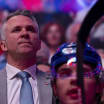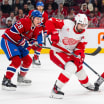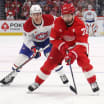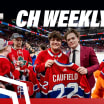Podcast highlights: Ryan Poehling
The Rocket forward was a guest of Marc Dumont on the History in the Making podcast
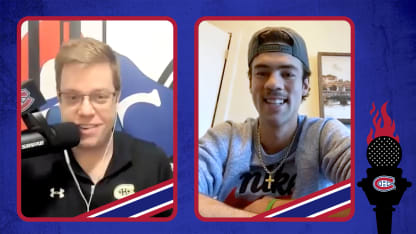
SHOP: Women's Red CH Logo Long Sleeves
The Lakeville, MN native recently spoke to Marc Dumont about dealing with last season's highs and lows, building his confidence and 200-foot game, and shared his thoughts on teammates Corey Schueneman, Joseph Blandisi and Josh Brook, among others.
Read on for a few highlights from Poehling's discussion with Dumont, which is available in its entirety wherever you get your podcasts.
MARC DUMONT:This group hasn't had a chance to bond a lot. How has that dynamic been in the locker room? I know you guys are tight.
RYAN POEHLING: It's definitely a different dynamic. You can't really do anything as a team, so I think that's where being on the road was nice. When you're at home, you're kind of just going to the rink and you can hang out there, but everyone just ends up going home. On the road, it's a little different. You can spend time together outside of the meal room. They have lounges for us where we can hang out. It was nice to go on a little two-week road trip and just hang out with the guys, enjoy each other's company and learn stuff about them that you didn't really know before outside of hockey.
MD: You're clearly a lot more confident this season. It's obvious in your game. How did you build your confidence up?
RP:I think the biggest thing is just trusting yourself. That's all you can do. People are always going to say what they want to say, but at the end of the day, you know who you are as a person and what you can do. For me, it's about staying true to myself. This year, it's not so much about picking up points, you just have to focus on things you can handle. Before a game, you can't say that you're going to get two or three points because you have no idea, but you can say you're going to have a great attitude on the bench and work hard. Those are the biggest things that I've brought to every game, and then the points will come.
MD:Let's talk about last season. How did you deal with some of the criticism you encountered?
RP: It was definitely tough for me. I wouldn't lie and say it was easy, but I think it teaches you a lot and you can learn from it. I was so caught up in it. You have a great game and you think you're the best player in the world, and you have a bad game and you think you're the worst player ever. I think that level of consistency and just bringing your best every night and also realizing that you've just got to stay level-headed through it all, that's what it taught me. You can't read into that stuff too much because regardless of how you do, there are going to be people on both sides of the spectrum.
Watch: Youtube Video
MD: What do experts most often get wrong about prospects?
RP:Everything is at the touch of your fingertips, so everyone is kind of used to instant satisfaction. When it doesn't happen that way, people get a little frustrated, but you have to realize that everyone's different and that everyone's going to progress at their own pace. Some guys can jump into the NHL right away and make a difference, but it might take three or four years for others. It may not be beneficial now, but down the road it'll be good for them in the long run.
MD: Head coach Joël Bouchard praised your 200-foot game this year. Talk about what helped you make progress there.
RP: To make it to the NHL, that's always how I've seen myself, as a guy that plays both ways. You should take pride in helping in the defensive zone because it's just as important as creating offense. I've worked on it a lot. What you come to realize is that a lot of it is timing. There's a little bit of skill involved, too, but the biggest thing is just working hard. There are so many plays you get scored on where you realize that if you just skated that extra stride, you could've prevented it. You think something might be harmless, but that's what it comes down to. Having that work ethic to put yourself in the right spot at all times just in case something does happen is what I've focused on the most.
MD:How good is it to play on such a young and exciting team?
RP:It's exciting. It's different because this league is usually a league where it's hard to win when you're young. A lot of teams that play their young guys usually just use it as a development year, but at the same time, for us to be having so many young guys and still winning, it shows a lot of character. You just have to tip your hat to the older guys. They do such a good job with the young guys, praising them and helping them make little plays. It goes a long way when you tell a young guy they made a nice play when they're struggling a little bit. It helps them mentally. The older guys should get praised for that because they do a great job with us.
Ryan Poehling re-watches his draft selection
MD:Tell us about Jordan Weal and what he brings to the group.
RP: Weal is one of the best. It could be so easy for him to just come down to the AHL and not care and just be disappointed about his situation, but he took the complete opposite approach and it's paying off for him. Everyone loves the guy. The coaching staff loves him, and rightfully so. He's a great player and he's a great person and a mentor for the young guys, especially me. I can learn so much from him. He's great on faceoffs and he's got a really good hockey IQ. You can't take things like that for granted. To have him on the team and learn from him is awesome.
Click here to find the show on your favorite podcast app.









